Jamaican Blue Mountain Coffee Beans
Jamaican Blue Mountain Coffee Beans are some of the most exclusive coffee beans in the world.
The country of Jamaica does everything in its power to keep it that way.
Jamaican coffee farmers recognized early on that they have ideal farming conditions in the Blue Mountain on Jamaica.
Do You Want the BEST Jamaican Blue Mountain Coffee Beans?
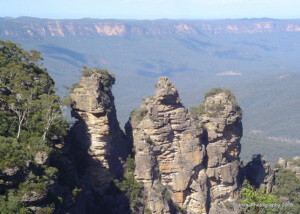
“The Blue Mountains” by Terrence Franck, via Flickr (CC BY-ND 2.0)
So, they trademarked the name Blue Mountain, and passed the Coffee Industry Regulation Act. In this legislation, Jamaica passed extreme laws regarding the production of coffee.
The legislation basically regulated the growing, processing, purchase and sale of coffee in Jamaica. And, it specifies restrictions on what quality of coffee beans are allowed to be exported from Jamaica.
From reading this legislation, it seems that Jamaica was pretty much allowing the government to restrict Jamaica from allowing anyone who wasn’t a member of the Board from being able to farm coffee.
This left most of the coffee bean production to be limited to these four regions of the Blue Mountain:
- Saint Andrew
- Saint Thomas
- Portland
- Saint Mary
By limiting the amount of coffee that could leave Jamaica, and putting restrictions that forced higher quality, Blue Mountain began to grow this market.
Then, the Laws of Supply and Demand took over. With the new trademark and supply limited to only a few farmers from specific locations in Jamaica, the Blue Mountain brand grew quickly and became well known for quality coffee.
Low, High, and Then There’s Blue
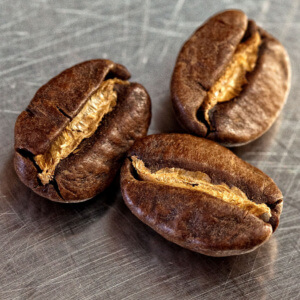
“Jamaica Blue Mountain” by Mon Œil, via Flickr (CC BY-ND 2.0)
Just like Goldilocks and the Three Bears, the Blue Mountain of Jamaica has three sizes of coffee.
Coffee beans grown at altitudes of 1,500 feet or lower are in the Low Mountain region. These beans are often referred to as Jamaica Supreme coffee beans.
Coffee beans grown at altitudes from 1,500 to 3,000 feet are called High Mountain region coffee beans.
But, it’s the coffee beans grown from 3,000 to 5,500 feet that are Just Right if we keep with the Goldilocks metaphor. Coffee beans grown in these elevations are what have become famous as Jamaican Blue Mountain coffee beans.
The Coffee Industry Regulation Act restricts the Blue Mountain name from being applied to any beans except those that are grown at those elevations.
Style? Blend? Or, Authentic Jamaican Blue Mountain?
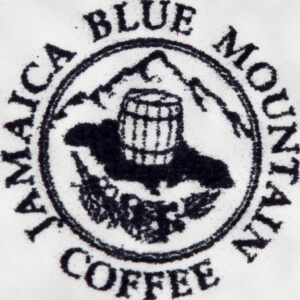
“Jamaica Blue Mountain Coffee” by Mark Morgan, via Flickr (CC BY 2.0)
While researching Jamaican Blue Mountain coffee beans, we came across several products that have worked around the restrictions of the Coffee Industry Regulation Act.
One of the gimmicks you will see is that they will name their coffee bean product something like Jamaican Blue Mountain Style coffee beans.
This means that they have tried to copy the characteristics of Jamaican Blue Mountain coffee beans. But, that they are not authentic.
Typically these Style types of beans are just trying to piggy back on the strong name that Jamaican Blue Mountain coffee beans have built. They do this because the strong quality reputation allows them to charge a premium for the name, even though they are not truly authentic.
The other trick coffee bean producers try is to mix in some expensive Jamaican Blue Mountain coffee beans with some cheaper coffee bean that just doesn’t have the same quality.
So, you have to be careful when shopping Jamaican Blue Mountain coffee beans.
Where Jamaican Blue Mountain is Grown
Jamaica has a rich history that includes many famous residents. But, one of the most famous parts of Jamaica is its Blue Mountain.
Blue Mountain covers almost the entire area of Eastern Jamaica. Blue Mountain is divided across four of the fourteen parishes in Eastern Jamaica.
Saint Andrew
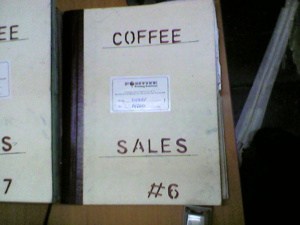
“Photo-0086” by Charlie Goren, via Flickr (CC BY-SA 2.0)
The parish of Saint Andrew is not only the home of Jamaican Blue Mountain coffee beans, but it is the home of the capital of Jamaica.
Kingston is the capital of Jamaica and has grown to cover more than half of the area of Saint Andrew’s parish.
But, most of Kingston is at lower elevations. Kingston is on the shore and provides one of the major ports of sea for Jamaica.
The Northern reaches of Saint Andrew are where you find the highest farming elevations that grow Jamaican Blue Mountain coffee beans.
The city of Mavis Bank is one of those tiny towns. The Mavis Bank Coffee Factory processes approximately 1.4 million coffee beans a year.
Saint Thomas
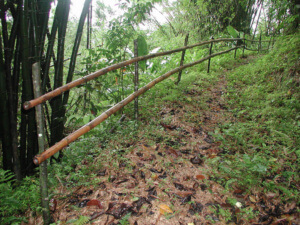
“a typical trail scene, st. thomas side” by Michael L. Dorn, via Flickr (CC BY-SA 2.0)
Saint Thomas parish is the least well known of the four mountain parishes for its Jamaican Blue Mountain coffee beans.
Christopher Columbus made his way to Jamaica in 1494. Like in America, he found many native Indians. It wasn’t for almost another 200 years before the British captured Jamaica and began to colonize it.
Years of slavery followed until slavery was abolished by Britain in 1834. Several years later during another colorful piece of Jamaican history, the Morant Bay Rebellion broke out after tension between freed slaves and farmers.
It wasn’t for another 100 years until farmers began to take advantage of the Jamaican Blue Mountain name.
Hagley Gap is one of the locations that is the most well known for Jamaican Blue Mountain coffee beans in Saint Thomas parish.
You’ll need a four wheel drive vehicle and some courage to make it up the winding rough roads to Hagley Gap. But, the view is beautiful. Just see for yourself in this article by Mikhail Whitmore, Gleaner Intern.
The folks from Hagley Gap are very proud of their Jamaican Blue Mountain coffee beans.
Portland
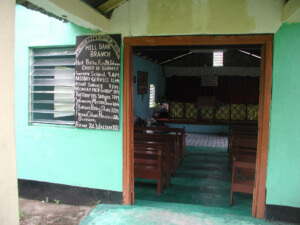
“sunday morning in rural jamaica” by Michael L. Dorn, via Flickr (CC BY-SA 2.0)
The Blue Mountains National Park resides in Portland parish in Jamaica. And, Portland parish has a history of receiving the most rainfall of any parish in Jamaica due to it being in the direct path of the northeast trade winds.
Having so much rain is a boon for Portland. However, being in the direct path of the northeast trade winds puts Jamaica into the direct path of hurricanes.
In 2013, Jamaica suffered a particularly bad hurricane season. To make matters worse, the coffee rust disease made it to Jamaica (most of Central America was affected).
Coffee production went from 500 boxes to about 100 in 2013.
Rowan’s Royale Coffee is one example of Portland Jamaican Blue Mountain coffee beans. It is situated in Silver Hill Gap in Portland parish at around 4,000 feet. They are one of several farmers that make great Jamaican Blue Mountain coffee beans.
Saint Mary
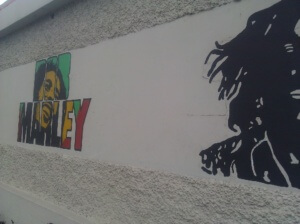
“IMG_20110722_142610” by JayHyuck Shin, via Flickr (CC BY-SA 2.0)
The Saint Mary parish is located on the Northwest side of Blue Mountain.
The Eastern third of Saint Mary grows Blue Mountain coffee beans in the Blue Mountain highlands.
Saint Mary not only produces Jamaican Blue Mountain coffee beans, it also farms and exports these other agricultural products:
- Annatto (food coloring tree)
- Bananas
- Breadfruit
- Cocoa
- Coconuts
- Pimento
- Sugar
- Various Vegetables
Saint Mary’s parish is also home to many Taíno/Arawak Indians that were the original natives of Jamaica before the British and French made their marks on Jamaica.
It’s More than a Lifestyle
Living in the Blue Mountains can be isolating and presents a unique way of life.
During our research, we found this very interesting video that includes a variety of beautiful images and interviews one of the local Blue Mountain natives.
I found this interview very interesting!
The Best Jamaican Blue Mountain Coffee Beans
Now that we’ve given you some of the background on what it means to have the Jamaican Blue Mountain label, we’d be remiss if we didn’t give you our recommendations for the best of this brand.
Each of these products did have a steep sticker price. However, even with the high prices, the feedback from users is that the beans were worth the price.
100% Jamaican Blue Mountain Coffee Brands
When you are looking for Jamaican Blue Mountain coffee beans, be careful to not just look for the trademark name.
Some manufacturers use Jamaican Blue Mountain in the name just so they can justify charging a little extra. But, when you read the fine print, you find out that the coffee is just Jamaican Blue Mountain Style coffee beans.
This typically means that less expensive and lower quality coffee beans are used in the product.
Here are two products that we feel live up to the Jamaican Blue Mountain name.
Island Blue 100% Jamaica Blue Mountain Whole Beans Coffee

[wpi_designer_button text='PURCHASE' link='/internal/IslandBlue100PercentJamaicaBlueMountain8oz' style_id='586' icon='digg' target='_blank']
Island Blue uses 100% Jamaican Blue Mountain coffee beans, so no need to talk about being that Style. since they are authentic Jamaican Blue Mountain through and through.
And, Island Blue is not a Blend of Jamaican Blue Mountain beans.
They are not mixed with other inferior, inexpensive coffee beans just to boost the profits of the manufacturer.
Island Blue 100% Jamaica Blue Mountain Whole Beans Coffee only includes coffee beans from small and medium size farms from the heights over 3,000 feet up the Blue Mountain.
This Blue Island coffee bean has lower acidic qualities. These are medium roasted coffee beans.
Jamaican Blue Mountain is in short supply these days. This drives the price up. We’ve given you a link to a smaller bag to keep the price somewhat down. If you’ve tried this coffee before and know how good it is, here is the link for a full pound bag.
Jablum Blue Mountain Roasted Whole Bean Coffee

[wpi_designer_button text='PURCHASE' link='/amazon/JablumBlueMountainRoastedWholeBeanCoffee' style_id='586' icon='digg' target='_blank']
Jablum Blue Mountain Roasted Whole Bean Coffee beans are Grade 1 level coffee beans. Not many coffee beans can live up to this standard.
Grade 1 standards live up to these high standards:
- No primary defects
- Zero to three full defects
- Sorted with a maximum of 5% above and 5% below specified screen size or range of screen size
- Exhibiting a distinct attribute in one or more of the following areas:
- Free of cup faults and taints
- Zero quakers allowed
- Moisture content between 9-13%
Mavis Bank Coffee Factory roasts and ships this 100% Jamaica Blue Mountain Coffee product line that is the most sought after in the world .
Jamaican Blue Mountain Blends
During our research, we found two products that had sufficiently high quality that we felt they deserved mention even though they were blends.
They do appear to be relying on the Jamaican Blue Mountain name to boost their price. We wouldn’t mention this except that users have reported that these are very good products even with the extra cost.
Magnum Exotics JBM Blend Coffee

[wpi_designer_button text='PURCHASE' link='/internal/MagnumExoticsJBMBlendCoffee' style_id='586' icon='digg' target='_blank']
By keeping the roasting batches small, they can better control the heat and provide a more even and consistent roasting level.
Magnum Exotics JBM Blend Coffee beans are a medium roast that leans toward a lighter roast. But, definitely not light enough to be called a light roast.
Those with dark roasting tastes are less pleased with the taste, but those with an affinity for medium roasts were simply gushing about the full body and the aroma of these beans.
These beans make coffee that has some acidity. But, not too much. Very few have complained that the acidity is too much.
Some describe these beans to provide a hint of chocolate notes.
Smile Jamaica Marley Coffee RealCups

[wpi_designer_button text='PURCHASE' link='/internal/SmileJamaicaMarleyCoffeeRealCups' style_id='586' icon='digg' target='_blank']
Be aware that the pods work out of the box for the older non-2.0 Keurig machines. To use them in a Keurig 2.0 machine is possible. But, you have to do some rigging to allow your 2.0 Keurig to skip the DRM stuff that a 2.0 Keurig is looking for.
To read more about how to bypass the Keurig DRM for your 2.0 machine, and for more info about Keurig in general, visit our Best Keurig Coffee Maker article that has a lot more about all types of Keurig machines.
All of the beans, including the JBM beans, are certified by the Rainforest Alliance. The mission of this alliance is:
“The Rainforest Alliance works to conserve biodiversity and
ensure sustainable livelihoods by transforming land-use practices,
business practices and consumer behavior.”
A nice program to get behind and support if you are someone with eco-friendly leanings.
The coffee in the pods for this product create Kosher coffee that is full bodied and acidic. The taste will appeal to those with a preference for medium roasts. And, the aroma is heavenly.
Conclusions: Jamaican Blue Mountain Coffee Beans
The Blue Mountain grows Jamaican Blue Mountain coffee beans above elevations of 3,000 feet.
The climate and rich soil of the Blue Mountain provides an ideal agricultural environment for coffee bean growing.
Do You Want the BEST Jamaican Blue Mountain Coffee Beans?
With the small number of farms on Blue Mountain, the supply and quality of JBM coffee beans makes these an exclusive product that is difficult to obtain for a reasonable price.
We’ve identified some manufacturers that we believe pass the test for quality and we hope can provide you with what you’re looking for with regard to Jamaican Blue Mountain Coffee Beans.
Sorry, the comment form is closed at this time.